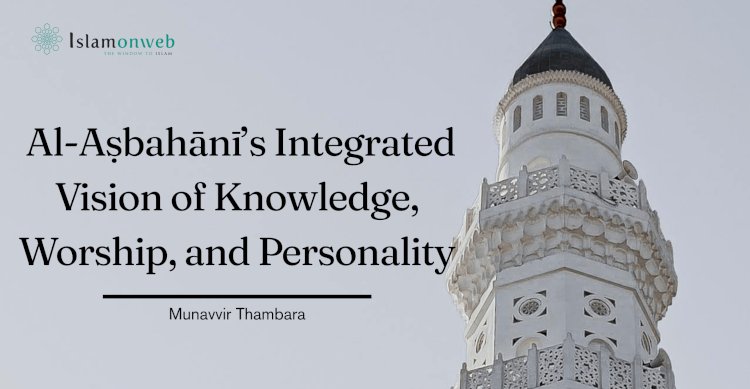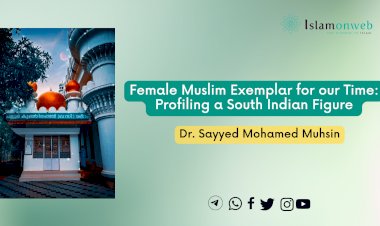From Khilāfah to Self-Realisation: Al-Aṣbahānī’s Integrated Vision of Knowledge, Worship, and Personality
There remain several uncertainties surrounding the life of Al-Aṣbahānī. Despite the efforts of numerous biographers to document his biography and gather reliable information, the available details are insufficient and fragmented, making it difficult to present a comprehensive account of his life. One of the main points of contention lies in the disagreement over his actual name. Some sources refer to him as al-Ḥusayn ibn al-Mufaḍḍal ibn Muḥammad, while others claim his name was al-Mufaḍḍal ibn Muḥammad. The most commonly cited name in the majority of sources is Abū al-Qāsim al-Ḥusayn ibn Muḥammad ibn al-Mufaḍḍal al-Aṣbahānī.
Likewise, his birth and death dates are uncertain. According to Khalīfah (1429 AH), he was born in 499 AH and is believed to have passed away around 502 AH.
Beyond his travels between al-Baghdād and al-Aṣbahān—undertaken primarily in pursuit and dissemination of religious knowledge—little else is known about the course of his life. Some reports suggest that he followed the Shāfiʿī school of jurisprudence and may have held theological inclinations aligned with either the Shīʿī or Muʿtazilī schools. However, following a thorough analysis of Al-Aṣbahānī's theological writings, Dr. ʿUmar ʿAbd al-Raḥmān al-Sārīsī concludes that he belonged to the Sunnī tradition in general, and more specifically to Ahl al-Sunnah wa al-Jamāʿah, based on his prominent affirmation of al-Firqah al-Nājiyah in one of his epistles on ʿAqīdah (Islamic creed).
Self-Actualisation and Valuation
Al-Aṣbahānī places great emphasis on the significance of man’s self-realisation and true nature. He explores the reality and purpose of human creation from various angles, especially highlighting the teleological dimension of human existence.
In this context, he outlines a path of development and elevation towards the rank for which man was created by Allāh—namely, that of khalīfah (vice-regent) on Earth. Among the seven benefits he enumerates for understanding oneself, one notable aspect is that a person begins to recognise his own faults and shortcomings. This awareness fosters humility, leading him to see the virtues in others and shifting his focus from criticising others to improving himself.
Al-Aṣbahānī views the creation of the world as being centred on human benefit and advantage. He argues that everything that has come into existence was created for the good of humanity. Drawing upon numerous Qur’ānic verses, he affirms the elevated status and purpose of humankind among all creatures. He explains that man was created to worship and serve his Lord, and that all of creation was made to facilitate this purpose.
Thus, he concludes that anyone who fails to fulfil the purpose for which they were created does not truly deserve to bear the title of “man.”
He grounds this view in the verse:
{وَمَا خَلَقْتُ الْجِنَّ وَالْإِنسَ إِلَّا لِيَعْبُدُونِ}
“And I did not create the jinn and mankind except to worship Me.”
(Sūrat al-Dhāriyāt, 51:56)
Accordingly, Al-Aṣbahānī asserts that true self-actualisation and self-worth can only be attained by fulfilling the divine purpose of existence. This realisation, in turn, paves the way to success in both this world and the Hereafter.
Al-Aṣbahānī’s Comprehension of Educational Psychology
Al-Aṣbahānī demonstrates a thoughtful approach to educational psychology by carefully distinguishing between concepts that are often used interchangeably. He defines ʿilm (knowledge) as the ability to comprehend and access the truth of things. Closely related, he defines dirāyah as knowledge acquired through experience and the application of examples.
In the same vein, he defines ḥikmah (wisdom) as any form of constructive knowledge that leads to morally upright behaviour. From this foundational understanding, Al-Aṣbahānī further categorises knowledge into distinct types. He identifies three levels of knowledge:
- Knowledge commonly acquired through substantial effort,
- Knowledge attained with minimal effort, and
- Knowledge that is exclusively granted to the Prophets and Messengers—unattainable by ordinary humans.
He also classifies information based on its relation to language: one type pertains merely to the word, another to both the word and its meaning, and the third solely to the meaning.
Recognising that every field of knowledge has its unique benefits and applications, Al-Aṣbahānī advises people to seek knowledge without belittling any discipline. He also urges the wise use of free time to gain beneficial knowledge, encouraging minimal involvement in worldly distractions.
Al-Aṣbahānī identifies two categories of individuals who attain wisdom:
- The first are those with advanced knowledge whose actions are rooted in faith. Such individuals strive to become sincere believers, as īmān is the foundation of both reason and righteous action. In contrast, a non-believer, lacking knowledge of Allāh and devotion to Him, is considered a human in form only, not in essence.
- The second are those specially favoured by Allāh with wisdom through ilhām (divine inspiration).
Through this philosophical framework, Al-Aṣbahānī offers a distinct psychological lens rooted in Islamic theology. It is within this paradigm that he critiques many of the so-called Greek philosophers and their followers.
In discussing the nafs (self), Al-Aṣbahānī addresses both its internal and external dimensions. Delving into aspects of developmental psychology, he traces human development from conception in the womb through to death. He notes that man progresses through stages of growth, both physical and intellectual, guided by his knowledge and shahwah (sensual desires). However, he cautions that unchecked desires often hinder cognitive and moral development, obstructing one’s path to virtue and perfection in knowledge.
Works of Al-Aṣbahānī
Al-Aṣbahānī authored works spanning various dimensions of Islamic thought. He employed a comparative approach in his writings, steering clear of bias or strict adherence to a single school of thought. Instead, he drew upon insights from across the spectrum of Sunnī theology, offering the strengths and virtues of each school. His balanced methodology earned him scholarly appreciation, especially for his notable work adh-Dharīʿah ilā Makārim al-Sharīʿah (The Means to the Excellence of Islamic Teachings).
Al-Aṣbahānī placed significant emphasis on the importance of understanding Qur’ānic exegesis through a proper grasp of its linguistic and terminological foundations. His contributions to Islamic psychology are particularly evident in two key works: the aforementioned adh-Dharīʿah and another titled Tafṣīl al-Nash’atayn wa Taḥṣīl al-Saʿādatayn (Clarification of the Two Origins and Attainment of the Two Successes).
The primary objective of the latter work was to guide readers toward success in both this world and the Hereafter. Within it, Al-Aṣbahānī discusses various human behaviours and traits through the lens of Islamic ethical principles, engaging with numerous psychological themes. He frames his discourse around three essential existential questions that have echoed throughout human inquiry:
- How did we come into existence?
- For whom were we created?
- Where are we ultimately headed?
These questions form the thematic foundation of his reflections on the human journey and the pursuit of ultimate fulfilment.
Theory of Different Emotions
In his work adh-Dharīʿah, Al-Aṣbahānī examines the emotion of anger (ghaḍab) and its related states from both physiological and psychological perspectives. He notes that when a person is overtaken by anger, their heart rate increases as blood rushes to the heart. This physical reaction, in turn, gives rise to various emotional responses such as grief (ḥuzn), rage, and resentment (ḥiqd).
Al-Aṣbahānī shows particular interest in distinguishing between different emotional states. For instance, he differentiates between ghibṭah (positive exultation or yearning for what others have without wishing them harm), munāfasah (healthy rivalry or competition), and ḥiqd (malicious resentment). Each of these emotions, though seemingly related, reflects distinct inner states and moral consequences.
He highlights the virtue of anger management and warns against allowing oneself to be dominated by such emotions. In his treatment of ṣabr (patience), he identifies multiple types, including physical endurance. However, he emphasises that psychological patience—inner restraint and emotional composure—is of greater significance, echoing the view of many classical scholars.
Al-Aṣbahānī also explores the concept of desire and emotional inclination. He defines love (ḥubb) as the soul’s tendency towards that which it perceives to be beneficial or pleasing. He distinguishes between two kinds of love:
- Natural love, which arises spontaneously from human instinct,
- Chosen love, which is cultivated through intentional reflection and choice.
Interestingly, he observes that justice (ʿadl) must serve as a safeguard over love. In instances where love is absent or insufficient, justice must intervene to ensure balance and fairness—acting as a moral watchdog that regulates emotional biases.
Sharīʿah, Reason, and Cognitive Abilities
Al-Aṣbahānī emphasises the mutual interdependence of Sharīʿah and reason (ʿaql). He asserts that reason, without the guidance of Sharīʿah, cannot attain its full potential or achieve true direction; conversely, Sharīʿah cannot be properly understood or applied without the engagement of reason. Thus, both are essential and complementary faculties in the life of a human being.
According to Al-Aṣbahānī, the path to self-actualisation lies in understanding the purpose and meaning of life—something attainable only through a rational interpretation of Sharīʿah. He describes Sharīʿah as the primary safeguard against psychological and spiritual illnesses. Just as pure water cleanses physical impurities, Sharīʿah purifies the soul from harmful pollutants.
To stress the importance of reason, Al-Aṣbahānī categorises it into two types:
- Innate reason – an inborn capacity for thought and reflection,
- Acquired reason (muktasab) – developed through education, upbringing, and experience.
This distinction implies that while some cognitive abilities are inherited, others must be cultivated. Crucially, he asserts that the proper development of both types requires the moral and spiritual framework provided by Sharīʿah. Only through adherence to divine guidance can one's intellectual faculties mature fully and function correctly.
Al-Aṣbahānī also outlines the numerous benefits of employing reason in a sound and disciplined manner. Most significantly, it enables a person to recognise and worship their Lord, avoid disobedience, and stay committed to the path of truth (ḥaqq).
Consideration Towards Worship
Al-Aṣbahānī defines ʿibādah (worship) as a voluntary act undertaken by the individual, often involving hardship or opposition to physical desires, solely for the purpose of drawing nearer to Allāh through obedience to His commands as set forth in the Sharīʿah. This definition is presented within his broader discussion of human perception and belief systems.
He classifies worship into two main components: knowledge and practice.
Further, he divides knowledge into two categories:
- Theoretical knowledge (ʿilm naẓarī) – which concerns the maʿrifah (gnosis) of Allāh,
- Practical knowledge (ʿilm ʿamalī) – which involves knowledge that finds meaning only through its application in action.
Similarly, Al-Aṣbahānī categorises actions into three types:
- Acts of the heart – such as intention, sincerity, and love for Allāh,
- Acts of the body – such as prayer, fasting, and charity,
- Combined acts – which engage both heart and body, reflecting the unity of inner belief and outward conduct.
Through this layered understanding, Al-Aṣbahānī highlights that worship is not merely ritualistic but a holistic engagement of the intellect, soul, and body, all directed towards attaining nearness to Allāh.
Personality Theories of Al-Aṣbahānī
Al-Aṣbahānī presents a nuanced perspective on personality by engaging with ideas that touch upon both individual psychology and social dynamics. He supports the notion of categorising human societies into hierarchical structures, recognising the diversity of roles within civilisation. This framework reflects his broader engagement with social psychology.
He acknowledges that human beings differ in personality traits, aptitudes, and dispositions, and that such individual distinctions are not only natural but necessary. According to Al-Aṣbahānī, these variations enable people to fulfil their distinct social functions and collectively realise the divine mandate of khilāfah (vicegerency) on Earth.
Furthermore, he examines the causes of personality differences, attributing them partly to innate factors and partly to external influences—particularly the impact of socialisation and the presence of role models. He suggests that a person's personality develops through interactions with their environment, shaped by the values and behaviours they observe and internalise.
Through this lens, Al-Aṣbahānī affirms that the diversity in human personalities is part of a divine design, facilitating social harmony and the fulfilment of higher spiritual and communal purposes.
About the author:
Munavvir Thambara is a degree scholar at Darul Huda Islamic University, specialising in the Department of ʿAqīdah and Philosophy. He is also pursuing a B.A.Poltical science at Calicut University. His research interests include Islamic politics and Religious studies, and Islamic History.
Reference :
Ar-Rāghib al-Aṣbahānī. Al-Dharī‘ah ‘ilā Makārim al-Sharī‘ah. 1st edition. Cairo: Maktabah al-Kullīyah al-Azharīyah, 1973.
Ar-Rāghib al-Aṣbahānī. Tafṣīl al-Nash’atayn wa Taḥṣīl al-Sa‘ādatayn. Beirut: Dār al-Gharb al-Islāmī, 1988.
Khalifah, ‘A.M. ‘Ilm al-Nafs fī Turāth al-Islāmī. 1st edition. Vol. 4. Cairo: Dar al-Salam, 1429 AH.
Rassool, G. Hussain, and Mugheera M. Luqman. Foundation of Islamic Psychology: From Classical Scholars to Contemporary Thinkers. New York: Routledge, 2023.
Hilami, M. "Ar-Raghib al-Asfahani wa Ara’uhu fi Kayfiyah Hall al-Mushkilah al-Akhlaqiyah." March 2, 2013.
Abu ‘Amr, M. Ar-Raghib al-Asfahani wa Mawqifuh min al-Firaq al-Islamiyah. Maktabah Shamilah, August 7, 2007.
Disclaimer
The views expressed in this article are the author’s own and do not necessarily mirror Islamonweb’s editorial stance.
























Leave A Comment